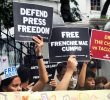Today, August 9, we join with other indigenous peoples around the world to commemorate the World Indigenous Peoples’ Day and celebrate our remarkable achievements, successes and even the hardships and challenges we have encountered in our historic struggle against the dominant neoliberal economic system in defence of our lands and rights.
This is also an opportune time to make more people aware of the issues and challenges faced by indigenous peoples in various parts of the country. International institutions and even Pope Francis himself have recognized the significant role and contributions of indigenous peoples in providing appropriate and strategic solutions to address major issues like climate change, food security and sovereignty, inequality and sustainability.
However, much as we would like to underscore the vital role of indigenous peoples in protecting the environment and building a just and sustainable society here in our country, we could not do so under the US-Aquino regime. It has already retreated on our rights as indigenous peoples and as human beings. Its persistent brutal treatment of indigenous peoples is already a form of ethnocide. For five years, Aquino has further intensified corporate land grabbing, dispossessing us of that with which our survival is closely linked – our lands.
In his last State of the Nation Address (SONA), Aquino was again silent on the true state of indigenous peoples even as he went on a tirade of lies of how his “daang matuwid” (righteous path) has raised the country’s global competitiveness and steered fast economic growth. The “daang matuwid” is a sham; it is at its best, political and economic marginalization of indigenous peoples.
Within five years, the US-Aquino regime has further strengthened its Public Private Partnership (PPP) program, a repackaging of the same liberalization, deregulation and privatization economic programs promoted by past administrations. It has even widened the control of imperialist countries or corporations and their local bourgeois comprador partners in running our economy while drastically weakening the State’s control over basic industries and social services.
In consequence, imperialist plunder has intensified further. There are now at least 410 hydropower, 27 geothermal and 33 coal projects which will further consolidate the monopoly of oligarchs – Aboitiz, Lopez, Ayala, Cojuangco – and their foreign business partners over energy and water services. Seven hundred seventy one mining applications have been approved, 251 of which cover ancestral lands; 55% of the more than one million hectares of land approved for mining is within indigenous territories and more than a thousand mining applications are still waiting to be processed.
At present, there are at least 125 agro-industrial projects across the country and 105 sites under the National Greening Program (NGP) covering more than 370,000 hectares of ancestral lands. Large-scale commercial logging persists and in the Caraga region alone, up to 300,000 hectares are covered by 11 logging concessions.
Imperialist plunder and militarization have driven off more than 40,000 Lumad (Mindanao’s indigenous peoples) from their territories because the US-Aquino regime considers them obstacles to its neoliberal policies. The Armed Forces of the Philippines (AFP) has deployed at least fifty-six percent of its soldiers in Mindanao to secure foreign business interests.
Indeed, the US-Aquino regime is hell bent on plundering our ancestral lands, forcibly displacing Lumad communities, destroying our livelihoods and their cultures, to satisfy the greed of corporate predators.
Intensifying militarization and paramilitarism, under the banner of Oplan Bayanihan, in indigenous communities belie the US-Aquino regime’s pro-peace posturing. Aquino’s true intention is to break apart our communities, destroy our leadership structures and relegate us to the lowest level of society and eventually eradicate us so that imperialist countries like the US could freely exploit our lands and resources. Like its predecessor, this government espouses militarism and impunity. Aquino’s Oplan Bayanihan is as ruthless and bloody as Arroyo’s Oplan Bantay Laya.
Sixty-one indigenous peoples have been killed; seven detained; nine incidents of bombings and fifty-two cases of forced evacuation happened in Mindanao. The political repression of legal democratic movement is also intensifying through the continuing harassment and filing of trumped-up cases against 176 leaders and members of IP mass organizations. Ninety-nine cases of harassment have been documented.
The government and its state forces including paramilitary groups like the Alamara are also attacking IP schools in clear violation of the inalienable right of children to education. One hundred forty six Lumad schools in Mindanao are suffering from various forms of military attack. The government’s closure order on 46 community schools have affected at least 1,700 Lumad students in Southern Mindanao. The attacks on IP schools is part of the systematic effort of the US-Aquino regime to further marginalize indigenous peoples by depriving them of culture-sensitive education for fear that Lumad children will become more capable of asserting their rights and resisting the onslaught of imperialist plunder.
We assail the government for being so heartless in dealing with the situation of the Lumad bakwits (evacuees). We recall how the congressional representative, a self-proclaimed deity from North Cotabato, insulted them by calling them stinky. She also instigated the July 23 “rescue” operations that led to the illegal and forcible dispersal of evacuees from Talaingod and Kapalong, Davao del Norte and San Fernando, Bukidnon seeking refuge at UCCP (United Church of Christ in the Philippines) Haran in Davao City. However, our leaders valiantly stood their ground and unmasked the pretentious deity of her evil intentions putting her back in the place where she rightfully belongs as a mortal.
We sincerely commend Dr. Cheloka Beyani, the United Nations Special Rapporteur on the human rights of internally displaced persons, for taking time to personally meet with the evacuees and listen to their testimonies. In his preliminary report, Dr. Beyani noted that “Conflict, militarization and displacement have become a common pattern in some localities” and criticized the Aquino for its “poor to non-existent responses to conflict-driven displacement crisis”. He also pointed out that displacement of indigenous peoples has “incalculable impact on their cultures and ways of life” and reminded the government to pay attention to the causes of displacement. The UNSR also admonished the Aquino government for its poor response to the victims of super typhoon Yolanda despite huge resources spent.
We anticipate that in his last year in power, BS Aquino will ramp up its anti-people policies and programs especially with regard to extractive industries. The government will certainly continue its aggressive selling of ancestral lands and natural resources to foreign monopoly capitalists and local bourgeois compradors. Militarization will further intensify and we can expect a sharp increase in human rights violations as well as massive corruption.
However, we remain unfazed. We must continue fighting for our lands and rights. Let us strengthen our solidarity with the peasants, workers and other sectors of society and continue to build a stronger peoples’ movement to end imperialist plunder, militarization, and national oppression. We believe that it is only under a nationalist and democratic society that we, indigenous peoples, will be able to enjoy our fundamental freedoms and exercise our collective rights most especially our inseparable rights to our ancestral lands and self-determination.





![[ANALYSIS] A different drug war](https://davaotoday.com/wp-content/uploads/2024/09/1000019103-110x100.png)




